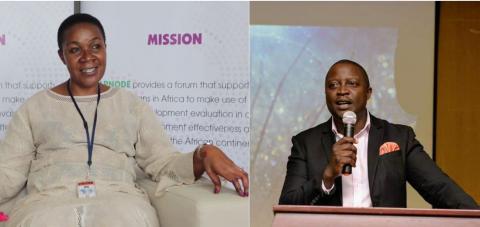
As part of Independent Development Evaluation’s (IDEV) contribution to the gLOCAL Evaluation Week that took place from 1 to 5 June 2020, IDEV facilitated a webinar co-organized by the African Parliamentarians’ Network on Development Evaluation (APNODE) and the Centre for Learning on Evaluation and Results-Anglophone Africa (CLEAR-AA). The webinar, which was held on 5 June 2020, aimed to share parliaments’ experiences in i) identifying national SDG priorities, ii) providing guidance on their implementation to ensure that national actions reflect and address specific national needs and circumstances, and iii) monitoring and tracking national progress towards the SDGs.
Over 50 participants from across Africa and beyond attended the webinar which was co-moderated by Mr. Kobena Hanson from IDEV and Ms. Hermine Engel from CLEAR-AA.
Hon. Evelyn Naomi Mpagi-Kaabule, former Member of Parliament from Uganda and APNODE Chairperson, and Hon. Stanley Kakubo, member of the National Assembly of Zambia and Interim Chairman of the Zambian APNODE National Chapter, served as panelists and shared their experience in implementing and tracking progress towards the SDGs. In their talk, they explored success factors and good practices for tracking SDG progress such as structures, partnerships and explicit actions put in place to facilitate this.
"Uganda was one of the first countries to localize and domesticate the SDGs. We - the parliament - ensured that all the SDGs are incorporated within national laws,” said Hon. Evelyn Naomi Mpagi-Kaabule. “Uganda is using a programme based budget system where all SDGs are considered.”
“In Zambia, we have specific portfolio and general committees that we use to provide oversight. We are able to interact almost daily with the Ministers on the implementation of the SDGs. We are constantly tracking progress and we submit a report on a quarterly basis,” replied Hon. Stanley Kakubo, member of the Zambian Parliament.
There was a lot of interest from participants, and this resulted in questions such as: How did the citizens of Zambia contribute to determining the priority programmes of the country towards the achievement of the SDGs?
“We rely on the structure of our parliament. Each parliamentarian has an office in his/her constituency where citizens can come and bring their issues and as parliamentarian, we pick these issues up and bring them to the House of Parliament,” explained Hon. Kakubo
The main challenges to meeting the SDGs targets as well as efforts undertaken by parliaments to mitigate these challenges – especially in light of COVID-19 and its impact - were also discussed.
“Some of our recent challenges have been with regard to COVID-19,” said Hon. Kakubo. “I think that countries should start off by carrying out a mid-term review of how far we have gone in the implementation of the SDGs, especially as a post-COVID-19 programme,” concluded Hon. Evelyn Mpagi-Kaabule.
You can find the recording of the webinar here.

